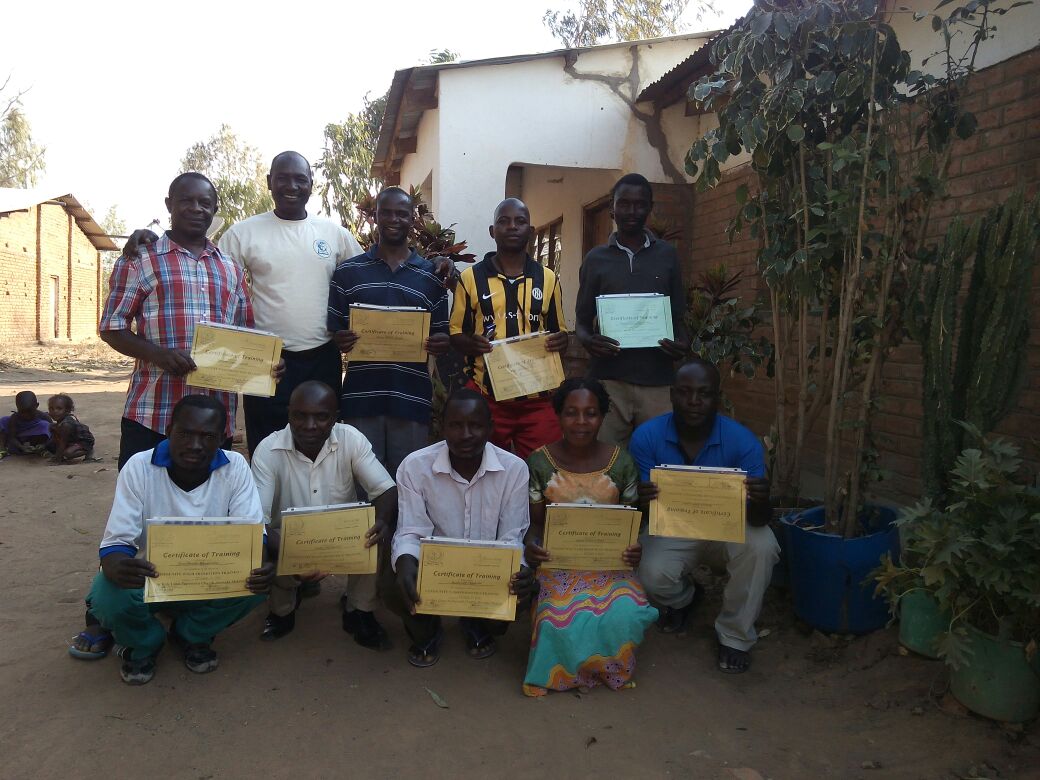At the start of this month I visited Malawi to assist a local church (Holy Cross Pentecostal Church) in their effort to drill and install 3 deep wells in three different villages of Malawi. Two of these wells, when completed would benefit the communities of Chazovu, (Kamphenda) and Luhono. Just before the wells were constructed, the partners trained Water Source and Sanitation Committees (WSSC) at the two communities.

In Luhono, the government Health Assistant also attended the training and he confessed that he had never heard of such a training for WSSCs. The Health Assistant took personal notes during the two days training with the intention of sharing the knowledge he had learned at the Malawi “Open Defecation Free” (ODF) campaign in his catchment area that included Luhono.
According to the Luhono Chief, the new well will be the second well in his community. Luhono has 712 households: “…with the second community well, time will be saved for other productive activities“, said the chief. The new well for Luhono will therefore benefit about 1,720 people, with an average of 5 people per household.
The Kamphenda area Chief, who also attended the training at Chazovu, said that the well would benefit over 130 households, about 600 people. At the Kamphenda training eight out of the nine WSSC members confessed Jesus Christ and where led to salvation by the facilitators.
The Malawi NEED!
Malawi’s WASH situation is far worse than Uganda, it appeared [to me] that Uganda doesn’t need Divine Waters as much as Malawi does. With the neediest community in Uganda still better-off in comparison to averaged served communities in Malawi when it comes to access to safe water sources in terms of distance and time taken to fetch this water. Watching Television; the daily news serves as a reminder that water is an issue in Malawi with every news report. Cities like Lilongwe and Blantyre have the longest queues at commercial water collection points, while low income families resort to drinking from rivers which have now turned muddy and more contaminated [due to the long drought] than those in the rural areas.
There is severe hunger and poverty due to this years’ prolonged drought. According to sources; usually a community would have enough maize till February but last season the harvest was affected by drought, and now two out of ten rural households cannot afford a meal a day. This condition will extend untill April 2017 when the next harvest is expected. The hunger has added to the burden of community health conditions beside the stress of limited access to safe water.

During a discussion with Bishop Eltone Mhango, He said, “Our [Lilongwe] city water is on from 10:00PM to 3:00AM (Local Time); that means every family cannot sleep until they have filled their domestic water drums that can run them at least two days”. He added that, Lilongwe is not the only town suffering with a water problem but it is a country wide challenge every year during dry season though Blantyre’s water crisis is worse than Lilongwe.

Driving North from the Lilongwe Airport, we stopped and saw an elderly woman, Elisabeth Tembo of 63 years from Muzimba on the road side; trying to fill her four litres water container, from a small disc in the rock, the size of a sugar bowl. She explained to us that on very bad days people from Muzimba drive and wait for hours to fill their 20 litres water container. Muzimba like any town in Malawi does not have any assurance of running water. The “sugar bowl spring” serves about a third of Muzimba’s town population.
As I continued to move around the northern part of Malawi in the areas of Muzimba, Muzuzu and Bolero, I continued to see the need for reliable clean water sources, and it was through this that I have returned to Uganda to appeal to you our friends, well-wishers and partners to join Divine Waters Uganda in a drive to reach out and give water to Malawi (The Warm Heart of Africa)

